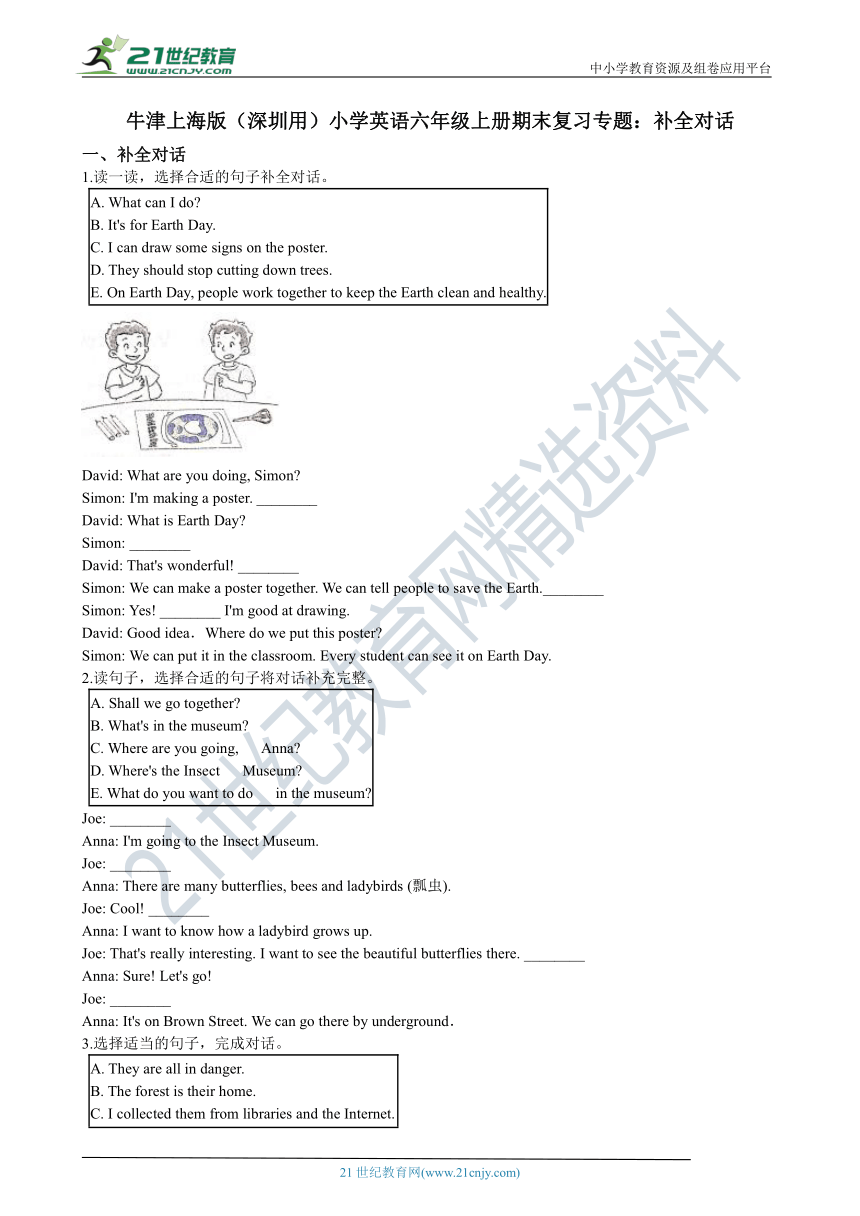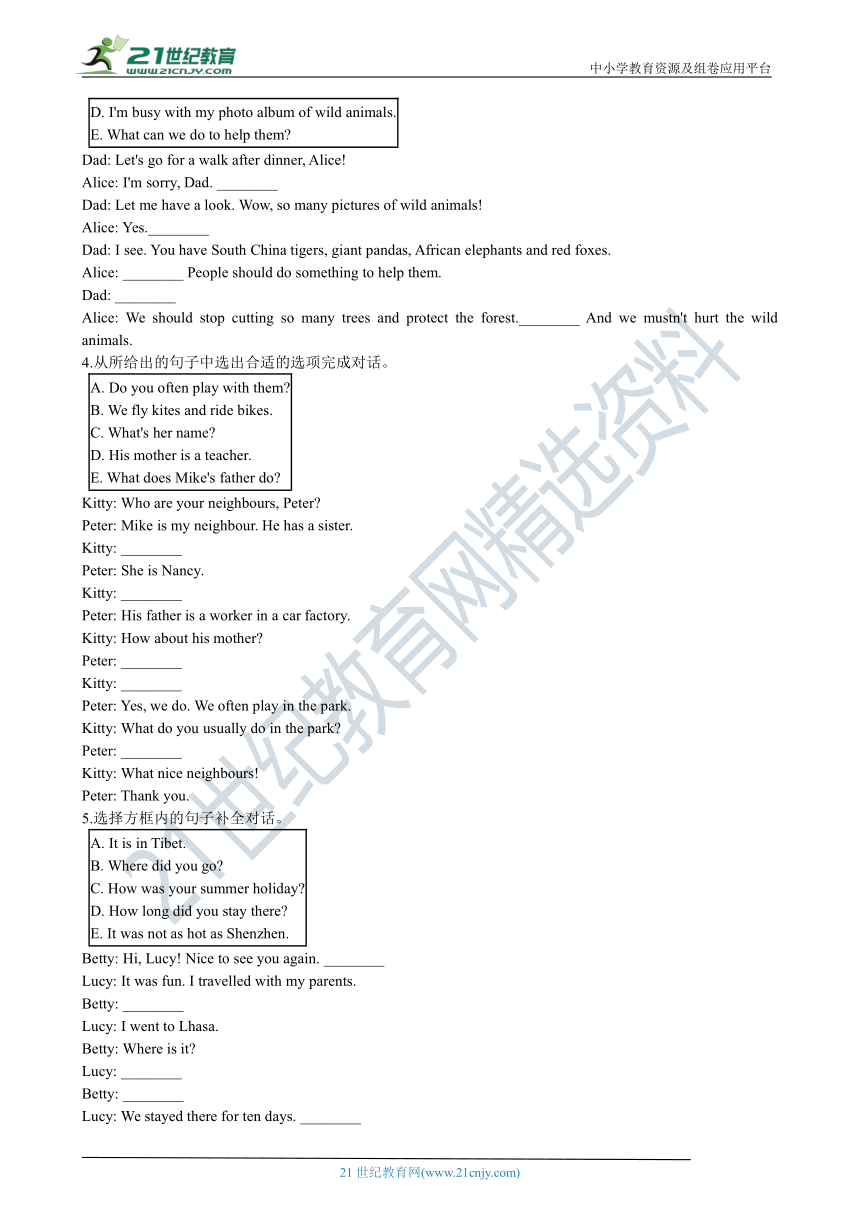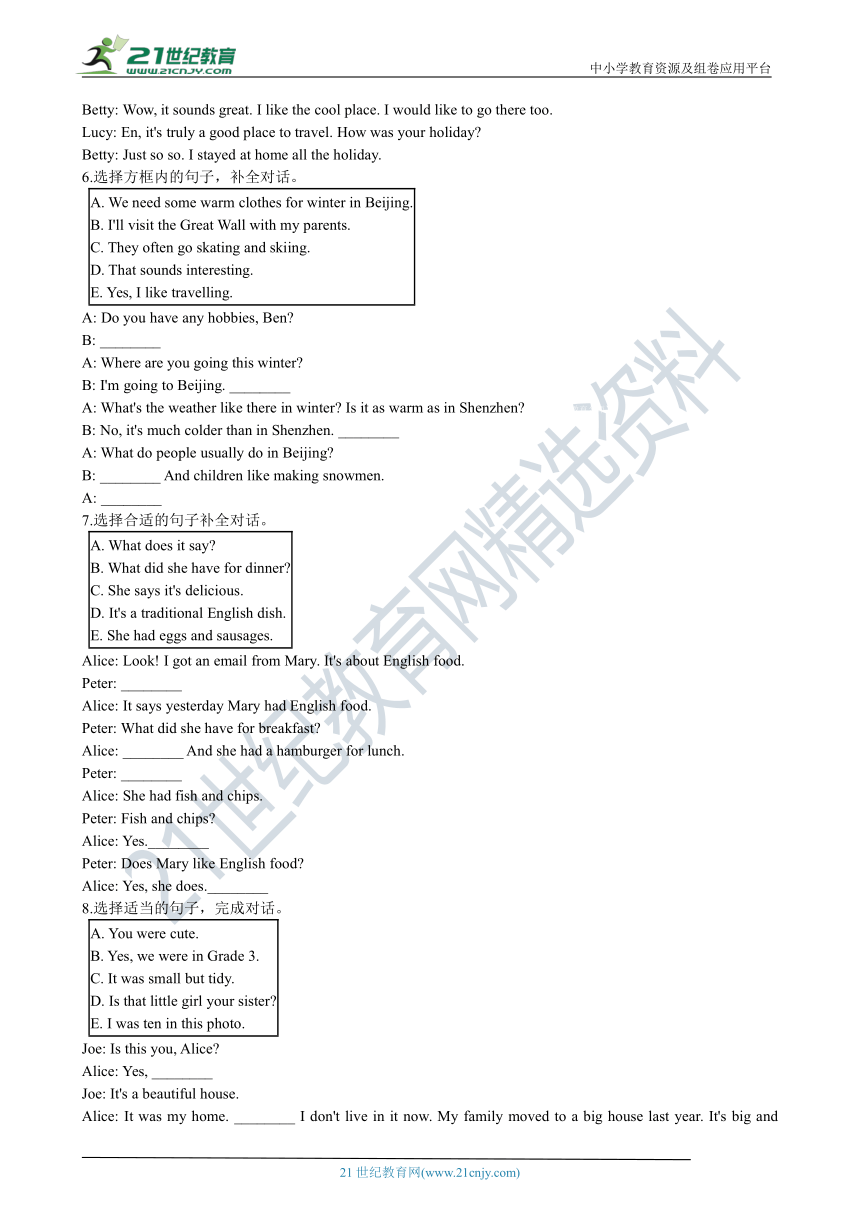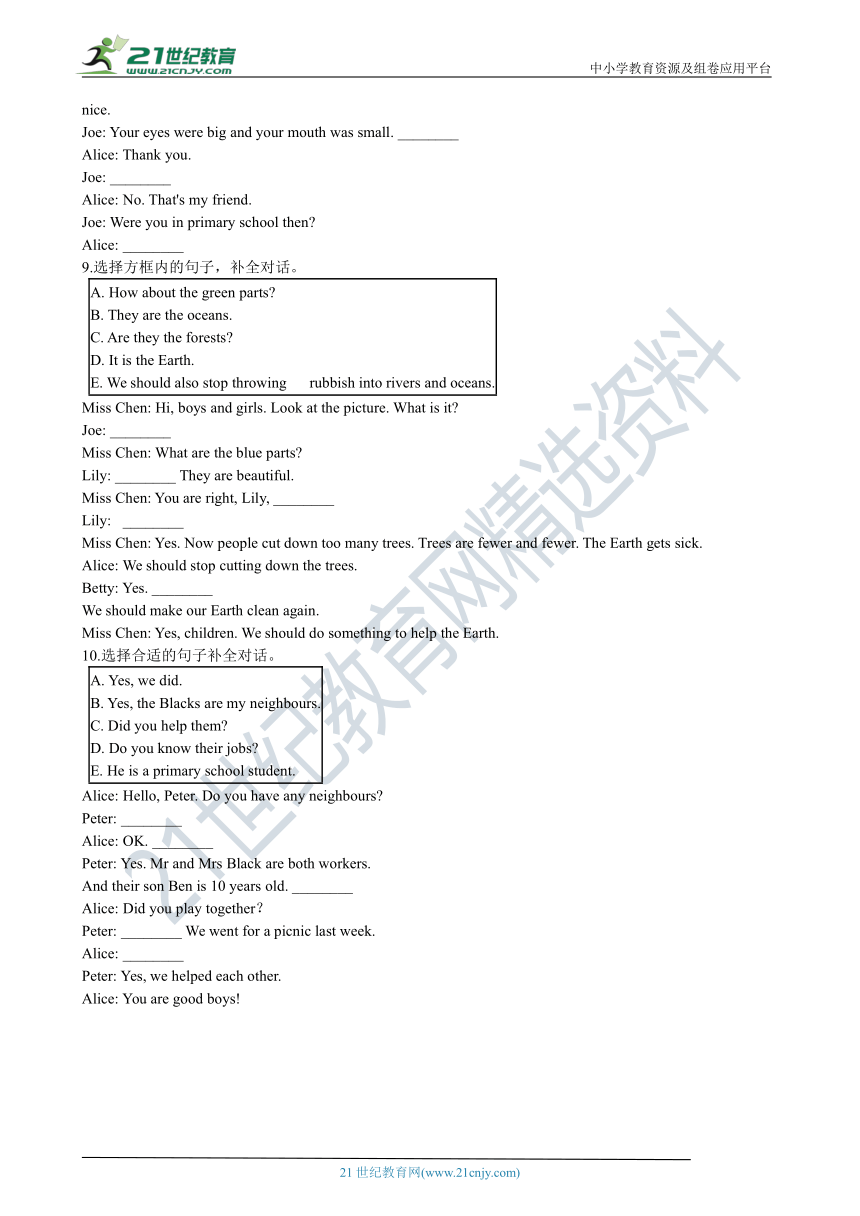牛津上海版(深圳用)小学英语六年级上册期末复习专题:补全对话(含答案及解析)
文档属性
| 名称 | 牛津上海版(深圳用)小学英语六年级上册期末复习专题:补全对话(含答案及解析) |  | |
| 格式 | doc | ||
| 文件大小 | 1.2MB | ||
| 资源类型 | 试卷 | ||
| 版本资源 | 牛津深圳版 | ||
| 科目 | 英语 | ||
| 更新时间 | 2021-01-12 14:57:10 | ||
图片预览




文档简介
中小学教育资源及组卷应用平台
牛津上海版(深圳用)小学英语六年级上册期末复习专题:补全对话
一、补全对话
1.读一读,选择合适的句子补全对话。
A. What can I _do?B._ It's for Earth Day.
C. I can draw some signs on the poster.
D. They should stop cutting down trees.
E. On Earth Day, people work together to keep the Earth clean and healthy.
David: What are you doing, Simon?
Simon: I'm making a poster. ________
David: What is Earth Day?
Simon: ________
David: That's wonderful! ________
Simon: W_e_can__make a poster together. We can tell people to save the Earth.________21世纪教育网版权所有
Simon: Yes! ________ I'm good at drawing.
David: Good idea.Where do we put this poster?
Simon: We__can_p_ut it in the classroom. Every student can see it on Earth Day.21*cnjy*com
2.读句子,选择合适的句子将对话补充完整。
A. Shall we go together? B. What's in the museum?
C. Where are you going, Anna?
D. Where's the Insect Museum?
E. What do you want to do in the museum?
Joe: ________
Anna: I'm going to the Insect Museum.
Joe: ________
Anna: There are many butterflies, bees and ladybirds (瓢虫).21cnjy.com
Joe: Cool! ________
Anna: I want to know how a ladybird grows up.
Joe: That's re_ally_i_nteresting. I want to see the beautiful butterflies there. ________
Anna: Sure! Let's go!
Joe: ________
Anna: It's on Brown Street. We can go there by underground.
3.选择适当的句子,完成对话。
A. They are all in danger. B. The forest is their home.
C. I collected them from libraries and the Internet.
D. I'm busy with my photo album of wild animals.
E. What can we do to help them?
Dad: Let's go for a walk after dinner, Alice!
Alice: I'm sorry, Dad. ________
Dad: Let me have a look. Wow, so many pictures of wild animals!21教育网
Alice: Yes.________
Dad: I see. You__have__South China tigers, giant pandas, African elephants and red foxes.
Alice: ________ People should do something to help them.
Dad: ________
Alice: _We_sho_uld stop cutting so many trees and protect the forest.________ And we mustn't hurt the wild animals.
4.从所给出的句子中选出合适的选项完成对话。
A. Do you often play with them? B. We fly kites and ride bikes.
C. What's her name?
D. His mother is a teacher.
E. What does Mike's father do?
Kitty: Who are your neighbours, Peter?
Peter: Mike is my neighbour. He has a sister.
Kitty: ________
Peter: She is Nancy.
Kitty: ________
Peter: His father is a worker in a car factory.
Kitty: How about his mother?
Peter: ________
Kitty: ________
Peter: Yes, we do. We often play in the park.
Kitty: What do you usually do in the park?
Peter: ________
Kitty: What nice neighbours!
Peter: Thank you.
5.选择方框内的句子补全对话。
A. It is in Tibet. B. Where did you go?
C. How was your summer holiday?
D. How long did you stay there?
E. It was not as hot as Shenzhen.
Betty: Hi, Lucy! Nice to see you again. ________
Lucy: It was fun. I travelled with my parents.
Betty: ________
Lucy: I went to Lhasa.
Betty: Where is it?
Lucy: ________
Betty: ________
Lucy: We stayed there for ten days. ________
Betty: Wow, _it_sou_nds great. I like the cool place. I would like to go there too.21穋穘穓穣
Lucy: En, it's truly a good place to travel. How was your holiday?21·世纪*教育网
Betty: Just so so. I stayed at home all the holiday.【来源:21cnj*y.co*m】
6.选择方框内的句子,补全对话。
A. We need some warm clothes for winter in Beijing. B. I'll visit the Great Wall with my parents.
C. They often go skating and skiing.
D. That sounds interesting.
E. Yes, I like travelling.
A: Do you have any hobbies, Ben?
B: ________
A: Where are you going this winter?
B: I'm going to Beijing. ________
A: Wha_t's_th_e weather like there in winter? Is it as warm as in Shenzhen?【出处:21教育名师】
B: No, it's much colder than in Shenzhen. ________【版权所有:21教育】
A: What do people usually do in Beijing?
B: ________ And children like making snowmen.
A: ________
7.选择合适的句子补全对话。
A. What does it say? B. What did she have for dinner?
C. She says it's delicious.
D. It's a traditional English dish.
E. She had eggs and sausages.
Alice: Look! I got an email from Mary. It's about English food.www-2-1-cnjy-com
Peter: ________
Alice: It says yesterday Mary had English food.
Peter: What did she have for breakfast?
Alice: ________ And she had a hamburger for lunch.
Peter: ________
Alice: She had fish and chips.
Peter: Fish and chips?
Alice: Yes.________
Peter: Does Mary like English food?
Alice: Yes, she does.________
8.选择适当的句子,完成对话。
A. You were cute. B. Yes, we were in Grade 3.
C. It was small but tidy.
D. Is that little girl your sister?
E. I was ten in this photo.
Joe: Is this you, Alice?
Alice: Yes, ________
Joe: It's a beautiful house.
Alice: I_t_was__my home. ________ I don't live in it now. My family moved to a big house last year. It's big and nice.www.21-cn-jy.com
Joe: Your eyes were big and your mouth was small. ________【来源:21·世纪·教育·网】
Alice: Thank you.
Joe: ________
Alice: No. That's my friend.
Joe: Were you in primary school then?
Alice: ________
9.选择方框内的句子,补全对话。
A. How about the green parts? B. They are the oceans.
C. Are they the forests?
D. It is the Earth.
E. We should also stop throwing rubbish into rivers and oceans.
Miss Chen: Hi, boys and girls. Look at the picture. What is it?2-1-c-n-j-y
Joe: ________
Miss Chen: What are the blue parts?
Lily: ________ They are beautiful.
Miss Chen: You are right, Lily, ________
Lily: 燺_______
Miss Chen: Yes.__Now_p_eople cut down too many trees. Trees are fewer and fewer. The Earth gets sick.
Alice: We should stop cutting down the trees.
Betty: Yes. ________
We should make our Earth clean again.
Miss Chen: Yes, children. We should do something to help the Earth.21教育名师原创作品
10.选择合适的句子补全对话。
A. Yes, we did. B. Yes, the Blacks are my neighbours.
C. Did you help them?
D. Do you know their jobs?
E. He is a primary school student.
Alice: Hello, Peter. Do you have any neighbours?
Peter: ________
Alice: OK. ________
Peter: Yes. Mr and Mrs Black are both workers.
And their son Ben is 10 years old. ________
Alice: Did you play together?
Peter: ________ We went for a picnic last week.
Alice: ________
Peter: Yes, we helped each other.
Alice: You are good boys!
答案解析部分
一、补全对话
1. B;E;A;D;C
【解析】【分_??????A._W_hat can I do?我能做什么?
B. It's for Earth Day.这是为地球日。
C. I can draw some signs on the poster.我可以在海报上画一些标志。
D. They should stop cutting down trees.他们应该停止砍伐树木。
E. On Earth Day, people work together to keep the Earth clean and healthy.在地球日,人们共同努力保持地球的清洁和健康。
(1)根据What is Earth Day?什么是地球日?可知上文提及地球日,故选B。
(2)根据What is Earth Day?什么是地球日?可知下文回答在地球日,人们要做的事情。故选E。
(3)根据We can make a poster together.我们可以一起做海报。可知上文询问能做什么,故选A。
(4)根据We can tell people to save the Earth.我们可以告诉人们拯救地球。可知下文表述拯救地球做的事情,故选D。
(5)根据I'm good at drawing.我擅长画画。可知上文表达画东西,故选C。
2. C;B;E;A;D
解:题目所给句_???????????????
_ A. Shall we go together? 我们一起去好吗?
B. What's in the museum? 博物馆里有什么?
C. Where are you going, Anna? 安娜,你要去哪里?
D. Where's the Insect Museum? 昆虫博物馆在哪里?
E. What do you want to do in the museum? 在博物馆你想做什么?
(1)根据答语:我要去昆虫博物馆。可知问句问要去哪里。用C. Where are you going, Anna?正确。故答案为:C。
(2)根据答语:有许多蝴蝶,蜜蜂和瓢虫。可知问句问有什么。用B. What's in the museum? 正确。故答案为:B。
(3)根据答语:我想要了解瓢虫如何长大。可知问句问想要做什么。用E. What do you want to do in the museum?正确。故答案为:E。
(4)根据答语:好的!我们走。可知问句提出建议,用A. Shall we go together? 正确。故答案为:A。
(5)根据答语:它在棕色大街。可知问句问位置。用D. Where's the Insect Museum? 正确。故答案为:D。
3. D;C;A;E;B
解:_A._The_y are all in danger.它们都处于危险之中。
B. The forest is their home.森林是它们的家。
C. I collected them from libraries and the Internet.我的野生动物相册。
D. I'm busy with my photo album of wild animals.我在忙我从图书馆和互联网上收集的。
E. What can we do to help them?我们能做些什么来帮助它们?
(1)根据下文 Let me have a look. Wow, so many pictures of wild animals! 让我看看。哇,这么多野生动物的照片!上文在整理照片。故答案为D.
(2)根据上文Yes.是的。下文有关具体照片内容。故答案为C.
(3)根据下文 People should do something to help them.人们应该做点什么来帮助他们。上文动物处于危险之中。故答案为A.
(4)根据下文We should stop cutting so many trees and protect the forest.我们应该停止砍树,保护森林。上文询问能做些什么来帮助它们。故答案为E.
(5)根据上文We should stop cutting so many trees and protect the forest.我们应该停止砍树,保护森林。下文回答森林是动物的家。故答案为B.
4. C;E;D;A;B
解:_A._Do_ you often play with them?你经常和他们一起玩吗?
B. We fly kites and ride bikes.我们放风筝和骑自行车。
C. What's her name?她叫什么名字?
D. His mother is a teacher.他妈妈是一名教师。
E. What does Mike's father do?迈克的爸爸是干什么的?
(1)根据下文She is Nancy.她叫南希。可知上文询问叫什么名字,故选C。
(2)根据下文His father is a worker in a car factory.他爸爸是一家汽车工厂的工人。可知上文询问他爸爸是干什么的,故选E。
(3)根据上文How about his mother??他妈妈呢?承接上文询问妈妈的职业,可知下文回答妈妈的职业,故选D。
(4)根据下文Yes, we do.是的,我们是。可知上文是助动词do开头的一般疑问句,故选A。
(5)根据上文What do you usually do in the park?你们通常在公园里个什么?可知下文回答干的事情,故选B。y*com
5. C;B;A;D;E
解:题目所给句子意思是:
A. It is in Tibet. 它在西藏。
B. Where did you go? 你要去哪里?
C. How was your summer holiday? 你暑假过得怎么样?
D. How long did you stay there? 你在那里待了多长时间?
E. It was n_ot_as__hot as Shenzhen. 他不像深圳一样炎热。
(1)根据答语“很不错。”可知问句问情况,用C. How was your summer holiday?正确。故答案为:C。
(2)根据答语“我去拉萨了。”可知问句问去哪里,用B. Where did you go?正确。故答案为:B。
(3)根据问句“它在哪里?”这是问位置,用A. It is in Tibet. 回答。故答案为:A。
(4)根据答语“我们在那里待了10天。”可知问句问待了多长时间,用D. How long did you stay there?正确。故答案为:D。
(5)根据答语“哇,听起来好极了。我喜欢凉爽的地方。”可知这里谈论天气,用E. It was not as hot as Shenzhen.正确。故答案为:E。
6. E;B;A;C;D
解:题目所给句子意思是:
A. We need some warm clothes for winter in Beijing. 在北京我们需要一些棉衣来过冬。
B. I'll visit the Great Wall with my parents. 我将和父母去游览长城。
C. They often go skating and skiing. 他们经常去滑冰和滑雪。
D. That soun_ds_int_eresting. 那听起来很有趣。
E.?Yes, I like travelling. 是,我喜欢旅游。
(1)根据上句说“你有什么爱好吗,本?”可知下句回答自己的爱好,用E.?Yes, I like travelling. 故答案为:E。
(2)根据上句“我们要去北京。”可知这里描述北京旅游的计划,用B. I'll visit the Great Wall with my parents.正确。故答案为:B。
(3)根据上句“不,它比深圳冷的多。”可知这里描述北京天气情况,用A. We need some warm clothes for winter in Beijing.正确。故答案为:A。
(4)根据问句“北京的人们经常做什么?”这是问做什么,用C. They often go skating and skiing.正确。故答案为:C。
(5)根据上句“孩子们喜欢堆雪人。”可知下文回答对堆雪人的看法,用D. That sounds interesting. 故答案为:D。
7. A;E;B;D;C
解:A_._What_ does it say?上面说了什么?
B. What did she have for dinner?她晚餐吃了什么?
C. She says it's delicious.她说很好吃。
D. It's a traditional English dish.这是一道传统的英国菜。
E. She had eggs and sausages.她吃了鸡蛋和香肠。
(1)根据下文It says yesterday Mary had English food.上面说昨天玛丽吃了英国菜。上文询问上面说了什么?故答案为A.
(2)根据上文What did she have for breakfast? 她早餐吃了什么?下文回答早餐食物。故答案为E.
(3)根据下文She had fish and chips. 她吃了炸鱼和薯条。一般是晚餐,上文询问晚餐吃了上面。故答案为B.
(4)根据上文Fish and chips? 炸鱼薯条?下文是有关这道菜。故答案为D.
(5)根据上文Yes, she does.是的,她是。下文回答有关玛丽对英国食物的感觉。故答案为C.
8. E;C;A;D;B
解:_é?????????????????_意思是:
A. You were cute. 你很可爱。
B. Yes, we were in Grade 3. 是,我们在三年级。
C. It was small but tidy. 它很小但是很整洁。
D. Is that little girl your sister? 那个小女孩是你的妹妹吗?
E. I was ten in this photo. 我在照片中10岁。
(1)根据前面句子:这是你吗,爱丽丝?可知这里照片,用E. I was ten in this photo. 正确。故答案为:E。
(2)根据前面句子:它是一个漂亮的房子。和这是我家。可知这里谈论房子,用C. It was small but tidy.正确。故答案为:C。
(3)根据前面句子:你的眼睛很大,并且你的嘴巴很小。可知这是谈论外面,用A. You were cute. 正确。故答案为:A。
(4)根据答语:不。那是我的朋友。可知问句问是不是你的家人,用D. Is that little girl your sister? 正确。故答案为:D。
(5)根据问句:那时们在小学吗?根据问句回答用B. Yes, we were in Grade 3.正确。故答案为:B。
9. D;B;A;C;E
解:题目所给句子意思是:
A. How about the green parts? 绿色部分呢?
B. They are the oceans. 它们是海洋。
C. Are they the forests? 它们是森林吗?
D. It is the Earth. 它是地球。
E. We shou_ld_als_o stop throwing rubbish into rivers and oceans. 我们还应该停止向河里和海里扔垃圾。
(1)根据问句:这是什么?问句问是什么,回答用D. It is the Earth. 正确。故答案为:D。
(2)根据问句:蓝色部分是什么?问句问蓝色部分,回答用B. They are the oceans.正确。故答案为:B。
(3)根据后面句子“是的。现在人们砍伐了太多的树木。”,可知这里和陆地森林有关,用A. How about the green parts? 正确。故答案为:A。
(4)根据答语“是的。现在人们砍伐了太多的树木。”可知这里是询问森林的一般疑问句,用C. Are they the forests? 正确。故答案为:C。
(5)根据上句“我们不应该砍伐树木。”和下句“我们应该再次使地球变得干净。”可知这里谈论保护环境,用E. We should also stop throwing rubbish into rivers and oceans.正确。故答案为:E。
10. B;D;E;A;C
解:A_._Yes,_ we did.是的,我们是。
B. Yes, the Blacks are my neighbours.是的,布莱克一家人是我的邻居。
C. Did you help them?你帮助他们了吗?
D. Do you know their jobs?你知道他们的工作吗?
E. He is a primary school student.他是个小学生。
(1)根据上文Do you have any neighbours?你有邻居吗?下文回答是肯定回答,并且指出税收邻居。故答案为B.
(2)根据下文Yes. Mr and Mrs Black are both workers.对。布莱克先生和夫人都是工人。上文询问是否知道他们工作。故答案为D.
(3)根据上文And their son Ben is 10 years old.他们的儿子本10岁。下文是小学生。故答案为E.
(4)根据上文Did you play together?你们一起玩吗?下文回答主语+did。故答案为A.
(5)根据下文Yes, we helped each other. 是的,我们互相帮助。上文询问是否帮助他们。故答案为C.
_21?????????è?????(www.21cnjy.com)_
牛津上海版(深圳用)小学英语六年级上册期末复习专题:补全对话
一、补全对话
1.读一读,选择合适的句子补全对话。
A. What can I _do?B._ It's for Earth Day.
C. I can draw some signs on the poster.
D. They should stop cutting down trees.
E. On Earth Day, people work together to keep the Earth clean and healthy.
David: What are you doing, Simon?
Simon: I'm making a poster. ________
David: What is Earth Day?
Simon: ________
David: That's wonderful! ________
Simon: W_e_can__make a poster together. We can tell people to save the Earth.________21世纪教育网版权所有
Simon: Yes! ________ I'm good at drawing.
David: Good idea.Where do we put this poster?
Simon: We__can_p_ut it in the classroom. Every student can see it on Earth Day.21*cnjy*com
2.读句子,选择合适的句子将对话补充完整。
A. Shall we go together? B. What's in the museum?
C. Where are you going, Anna?
D. Where's the Insect Museum?
E. What do you want to do in the museum?
Joe: ________
Anna: I'm going to the Insect Museum.
Joe: ________
Anna: There are many butterflies, bees and ladybirds (瓢虫).21cnjy.com
Joe: Cool! ________
Anna: I want to know how a ladybird grows up.
Joe: That's re_ally_i_nteresting. I want to see the beautiful butterflies there. ________
Anna: Sure! Let's go!
Joe: ________
Anna: It's on Brown Street. We can go there by underground.
3.选择适当的句子,完成对话。
A. They are all in danger. B. The forest is their home.
C. I collected them from libraries and the Internet.
D. I'm busy with my photo album of wild animals.
E. What can we do to help them?
Dad: Let's go for a walk after dinner, Alice!
Alice: I'm sorry, Dad. ________
Dad: Let me have a look. Wow, so many pictures of wild animals!21教育网
Alice: Yes.________
Dad: I see. You__have__South China tigers, giant pandas, African elephants and red foxes.
Alice: ________ People should do something to help them.
Dad: ________
Alice: _We_sho_uld stop cutting so many trees and protect the forest.________ And we mustn't hurt the wild animals.
4.从所给出的句子中选出合适的选项完成对话。
A. Do you often play with them? B. We fly kites and ride bikes.
C. What's her name?
D. His mother is a teacher.
E. What does Mike's father do?
Kitty: Who are your neighbours, Peter?
Peter: Mike is my neighbour. He has a sister.
Kitty: ________
Peter: She is Nancy.
Kitty: ________
Peter: His father is a worker in a car factory.
Kitty: How about his mother?
Peter: ________
Kitty: ________
Peter: Yes, we do. We often play in the park.
Kitty: What do you usually do in the park?
Peter: ________
Kitty: What nice neighbours!
Peter: Thank you.
5.选择方框内的句子补全对话。
A. It is in Tibet. B. Where did you go?
C. How was your summer holiday?
D. How long did you stay there?
E. It was not as hot as Shenzhen.
Betty: Hi, Lucy! Nice to see you again. ________
Lucy: It was fun. I travelled with my parents.
Betty: ________
Lucy: I went to Lhasa.
Betty: Where is it?
Lucy: ________
Betty: ________
Lucy: We stayed there for ten days. ________
Betty: Wow, _it_sou_nds great. I like the cool place. I would like to go there too.21穋穘穓穣
Lucy: En, it's truly a good place to travel. How was your holiday?21·世纪*教育网
Betty: Just so so. I stayed at home all the holiday.【来源:21cnj*y.co*m】
6.选择方框内的句子,补全对话。
A. We need some warm clothes for winter in Beijing. B. I'll visit the Great Wall with my parents.
C. They often go skating and skiing.
D. That sounds interesting.
E. Yes, I like travelling.
A: Do you have any hobbies, Ben?
B: ________
A: Where are you going this winter?
B: I'm going to Beijing. ________
A: Wha_t's_th_e weather like there in winter? Is it as warm as in Shenzhen?【出处:21教育名师】
B: No, it's much colder than in Shenzhen. ________【版权所有:21教育】
A: What do people usually do in Beijing?
B: ________ And children like making snowmen.
A: ________
7.选择合适的句子补全对话。
A. What does it say? B. What did she have for dinner?
C. She says it's delicious.
D. It's a traditional English dish.
E. She had eggs and sausages.
Alice: Look! I got an email from Mary. It's about English food.www-2-1-cnjy-com
Peter: ________
Alice: It says yesterday Mary had English food.
Peter: What did she have for breakfast?
Alice: ________ And she had a hamburger for lunch.
Peter: ________
Alice: She had fish and chips.
Peter: Fish and chips?
Alice: Yes.________
Peter: Does Mary like English food?
Alice: Yes, she does.________
8.选择适当的句子,完成对话。
A. You were cute. B. Yes, we were in Grade 3.
C. It was small but tidy.
D. Is that little girl your sister?
E. I was ten in this photo.
Joe: Is this you, Alice?
Alice: Yes, ________
Joe: It's a beautiful house.
Alice: I_t_was__my home. ________ I don't live in it now. My family moved to a big house last year. It's big and nice.www.21-cn-jy.com
Joe: Your eyes were big and your mouth was small. ________【来源:21·世纪·教育·网】
Alice: Thank you.
Joe: ________
Alice: No. That's my friend.
Joe: Were you in primary school then?
Alice: ________
9.选择方框内的句子,补全对话。
A. How about the green parts? B. They are the oceans.
C. Are they the forests?
D. It is the Earth.
E. We should also stop throwing rubbish into rivers and oceans.
Miss Chen: Hi, boys and girls. Look at the picture. What is it?2-1-c-n-j-y
Joe: ________
Miss Chen: What are the blue parts?
Lily: ________ They are beautiful.
Miss Chen: You are right, Lily, ________
Lily: 燺_______
Miss Chen: Yes.__Now_p_eople cut down too many trees. Trees are fewer and fewer. The Earth gets sick.
Alice: We should stop cutting down the trees.
Betty: Yes. ________
We should make our Earth clean again.
Miss Chen: Yes, children. We should do something to help the Earth.21教育名师原创作品
10.选择合适的句子补全对话。
A. Yes, we did. B. Yes, the Blacks are my neighbours.
C. Did you help them?
D. Do you know their jobs?
E. He is a primary school student.
Alice: Hello, Peter. Do you have any neighbours?
Peter: ________
Alice: OK. ________
Peter: Yes. Mr and Mrs Black are both workers.
And their son Ben is 10 years old. ________
Alice: Did you play together?
Peter: ________ We went for a picnic last week.
Alice: ________
Peter: Yes, we helped each other.
Alice: You are good boys!
答案解析部分
一、补全对话
1. B;E;A;D;C
【解析】【分_??????A._W_hat can I do?我能做什么?
B. It's for Earth Day.这是为地球日。
C. I can draw some signs on the poster.我可以在海报上画一些标志。
D. They should stop cutting down trees.他们应该停止砍伐树木。
E. On Earth Day, people work together to keep the Earth clean and healthy.在地球日,人们共同努力保持地球的清洁和健康。
(1)根据What is Earth Day?什么是地球日?可知上文提及地球日,故选B。
(2)根据What is Earth Day?什么是地球日?可知下文回答在地球日,人们要做的事情。故选E。
(3)根据We can make a poster together.我们可以一起做海报。可知上文询问能做什么,故选A。
(4)根据We can tell people to save the Earth.我们可以告诉人们拯救地球。可知下文表述拯救地球做的事情,故选D。
(5)根据I'm good at drawing.我擅长画画。可知上文表达画东西,故选C。
2. C;B;E;A;D
解:题目所给句_???????????????
_ A. Shall we go together? 我们一起去好吗?
B. What's in the museum? 博物馆里有什么?
C. Where are you going, Anna? 安娜,你要去哪里?
D. Where's the Insect Museum? 昆虫博物馆在哪里?
E. What do you want to do in the museum? 在博物馆你想做什么?
(1)根据答语:我要去昆虫博物馆。可知问句问要去哪里。用C. Where are you going, Anna?正确。故答案为:C。
(2)根据答语:有许多蝴蝶,蜜蜂和瓢虫。可知问句问有什么。用B. What's in the museum? 正确。故答案为:B。
(3)根据答语:我想要了解瓢虫如何长大。可知问句问想要做什么。用E. What do you want to do in the museum?正确。故答案为:E。
(4)根据答语:好的!我们走。可知问句提出建议,用A. Shall we go together? 正确。故答案为:A。
(5)根据答语:它在棕色大街。可知问句问位置。用D. Where's the Insect Museum? 正确。故答案为:D。
3. D;C;A;E;B
解:_A._The_y are all in danger.它们都处于危险之中。
B. The forest is their home.森林是它们的家。
C. I collected them from libraries and the Internet.我的野生动物相册。
D. I'm busy with my photo album of wild animals.我在忙我从图书馆和互联网上收集的。
E. What can we do to help them?我们能做些什么来帮助它们?
(1)根据下文 Let me have a look. Wow, so many pictures of wild animals! 让我看看。哇,这么多野生动物的照片!上文在整理照片。故答案为D.
(2)根据上文Yes.是的。下文有关具体照片内容。故答案为C.
(3)根据下文 People should do something to help them.人们应该做点什么来帮助他们。上文动物处于危险之中。故答案为A.
(4)根据下文We should stop cutting so many trees and protect the forest.我们应该停止砍树,保护森林。上文询问能做些什么来帮助它们。故答案为E.
(5)根据上文We should stop cutting so many trees and protect the forest.我们应该停止砍树,保护森林。下文回答森林是动物的家。故答案为B.
4. C;E;D;A;B
解:_A._Do_ you often play with them?你经常和他们一起玩吗?
B. We fly kites and ride bikes.我们放风筝和骑自行车。
C. What's her name?她叫什么名字?
D. His mother is a teacher.他妈妈是一名教师。
E. What does Mike's father do?迈克的爸爸是干什么的?
(1)根据下文She is Nancy.她叫南希。可知上文询问叫什么名字,故选C。
(2)根据下文His father is a worker in a car factory.他爸爸是一家汽车工厂的工人。可知上文询问他爸爸是干什么的,故选E。
(3)根据上文How about his mother??他妈妈呢?承接上文询问妈妈的职业,可知下文回答妈妈的职业,故选D。
(4)根据下文Yes, we do.是的,我们是。可知上文是助动词do开头的一般疑问句,故选A。
(5)根据上文What do you usually do in the park?你们通常在公园里个什么?可知下文回答干的事情,故选B。y*com
5. C;B;A;D;E
解:题目所给句子意思是:
A. It is in Tibet. 它在西藏。
B. Where did you go? 你要去哪里?
C. How was your summer holiday? 你暑假过得怎么样?
D. How long did you stay there? 你在那里待了多长时间?
E. It was n_ot_as__hot as Shenzhen. 他不像深圳一样炎热。
(1)根据答语“很不错。”可知问句问情况,用C. How was your summer holiday?正确。故答案为:C。
(2)根据答语“我去拉萨了。”可知问句问去哪里,用B. Where did you go?正确。故答案为:B。
(3)根据问句“它在哪里?”这是问位置,用A. It is in Tibet. 回答。故答案为:A。
(4)根据答语“我们在那里待了10天。”可知问句问待了多长时间,用D. How long did you stay there?正确。故答案为:D。
(5)根据答语“哇,听起来好极了。我喜欢凉爽的地方。”可知这里谈论天气,用E. It was not as hot as Shenzhen.正确。故答案为:E。
6. E;B;A;C;D
解:题目所给句子意思是:
A. We need some warm clothes for winter in Beijing. 在北京我们需要一些棉衣来过冬。
B. I'll visit the Great Wall with my parents. 我将和父母去游览长城。
C. They often go skating and skiing. 他们经常去滑冰和滑雪。
D. That soun_ds_int_eresting. 那听起来很有趣。
E.?Yes, I like travelling. 是,我喜欢旅游。
(1)根据上句说“你有什么爱好吗,本?”可知下句回答自己的爱好,用E.?Yes, I like travelling. 故答案为:E。
(2)根据上句“我们要去北京。”可知这里描述北京旅游的计划,用B. I'll visit the Great Wall with my parents.正确。故答案为:B。
(3)根据上句“不,它比深圳冷的多。”可知这里描述北京天气情况,用A. We need some warm clothes for winter in Beijing.正确。故答案为:A。
(4)根据问句“北京的人们经常做什么?”这是问做什么,用C. They often go skating and skiing.正确。故答案为:C。
(5)根据上句“孩子们喜欢堆雪人。”可知下文回答对堆雪人的看法,用D. That sounds interesting. 故答案为:D。
7. A;E;B;D;C
解:A_._What_ does it say?上面说了什么?
B. What did she have for dinner?她晚餐吃了什么?
C. She says it's delicious.她说很好吃。
D. It's a traditional English dish.这是一道传统的英国菜。
E. She had eggs and sausages.她吃了鸡蛋和香肠。
(1)根据下文It says yesterday Mary had English food.上面说昨天玛丽吃了英国菜。上文询问上面说了什么?故答案为A.
(2)根据上文What did she have for breakfast? 她早餐吃了什么?下文回答早餐食物。故答案为E.
(3)根据下文She had fish and chips. 她吃了炸鱼和薯条。一般是晚餐,上文询问晚餐吃了上面。故答案为B.
(4)根据上文Fish and chips? 炸鱼薯条?下文是有关这道菜。故答案为D.
(5)根据上文Yes, she does.是的,她是。下文回答有关玛丽对英国食物的感觉。故答案为C.
8. E;C;A;D;B
解:_é?????????????????_意思是:
A. You were cute. 你很可爱。
B. Yes, we were in Grade 3. 是,我们在三年级。
C. It was small but tidy. 它很小但是很整洁。
D. Is that little girl your sister? 那个小女孩是你的妹妹吗?
E. I was ten in this photo. 我在照片中10岁。
(1)根据前面句子:这是你吗,爱丽丝?可知这里照片,用E. I was ten in this photo. 正确。故答案为:E。
(2)根据前面句子:它是一个漂亮的房子。和这是我家。可知这里谈论房子,用C. It was small but tidy.正确。故答案为:C。
(3)根据前面句子:你的眼睛很大,并且你的嘴巴很小。可知这是谈论外面,用A. You were cute. 正确。故答案为:A。
(4)根据答语:不。那是我的朋友。可知问句问是不是你的家人,用D. Is that little girl your sister? 正确。故答案为:D。
(5)根据问句:那时们在小学吗?根据问句回答用B. Yes, we were in Grade 3.正确。故答案为:B。
9. D;B;A;C;E
解:题目所给句子意思是:
A. How about the green parts? 绿色部分呢?
B. They are the oceans. 它们是海洋。
C. Are they the forests? 它们是森林吗?
D. It is the Earth. 它是地球。
E. We shou_ld_als_o stop throwing rubbish into rivers and oceans. 我们还应该停止向河里和海里扔垃圾。
(1)根据问句:这是什么?问句问是什么,回答用D. It is the Earth. 正确。故答案为:D。
(2)根据问句:蓝色部分是什么?问句问蓝色部分,回答用B. They are the oceans.正确。故答案为:B。
(3)根据后面句子“是的。现在人们砍伐了太多的树木。”,可知这里和陆地森林有关,用A. How about the green parts? 正确。故答案为:A。
(4)根据答语“是的。现在人们砍伐了太多的树木。”可知这里是询问森林的一般疑问句,用C. Are they the forests? 正确。故答案为:C。
(5)根据上句“我们不应该砍伐树木。”和下句“我们应该再次使地球变得干净。”可知这里谈论保护环境,用E. We should also stop throwing rubbish into rivers and oceans.正确。故答案为:E。
10. B;D;E;A;C
解:A_._Yes,_ we did.是的,我们是。
B. Yes, the Blacks are my neighbours.是的,布莱克一家人是我的邻居。
C. Did you help them?你帮助他们了吗?
D. Do you know their jobs?你知道他们的工作吗?
E. He is a primary school student.他是个小学生。
(1)根据上文Do you have any neighbours?你有邻居吗?下文回答是肯定回答,并且指出税收邻居。故答案为B.
(2)根据下文Yes. Mr and Mrs Black are both workers.对。布莱克先生和夫人都是工人。上文询问是否知道他们工作。故答案为D.
(3)根据上文And their son Ben is 10 years old.他们的儿子本10岁。下文是小学生。故答案为E.
(4)根据上文Did you play together?你们一起玩吗?下文回答主语+did。故答案为A.
(5)根据下文Yes, we helped each other. 是的,我们互相帮助。上文询问是否帮助他们。故答案为C.
_21?????????è?????(www.21cnjy.com)_
同课章节目录
